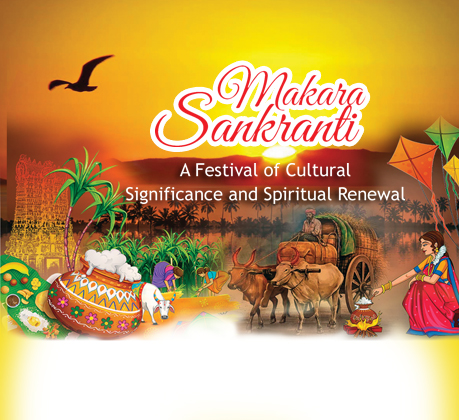A Festival of Cultural Significance and Spiritual Renewal
Makara Sankranti, a vibrant and joyous Hindu festival, resonates deeply with the cultural, agricultural, and spiritual dimensions of India. Observed with fervor and enthusiasm annually on January 14th, this auspicious occasion marks the
sun’s transition into the zodiac sign of Capricorn (Makara).
For many regions in India, Makara Sankranti is synonymous with a harvest festival. The ready-to-harvest crops, particularly the winter crops, represent prosperity and abundance. The festival celebrates the dedication and hard work of
farmers, acknowledging their invaluable contribution to society’s sustenance.
During Makara Sankranti, devotees engage in ritualistic dips in holy rivers, believing it to be a means of cleansing their sins and purifying their souls. Bathing in sacred rivers like the Ganges is considered particularly auspicious,
symbolizing a spiritual rebirth and a fresh start.
Traditional foods prepared with sesame seeds, jaggery, and newly harvested grains are an integral part of Makara Sankranti celebrations. These delectable and nutritious dishes not only provide warmth and energy during the winter months but
also hold symbolic importance. Kite flying is a ubiquitous tradition during Makara Sankranti, particularly in regions like Gujarat and Rajasthan. The colorful kites soaring high in the sky symbolize the joyous transition to longer,
sun-filled days.
Makara Sankranti is celebrated across India with unique names and customs. In Tamil Nadu, it’s Pongal, a four-day harvest fest. Punjab calls it Lohri, a bonfire celebration before Makara Sankranti. Assam observes Magh Bihu, marking the end
of the Assamese month of Magh. These variations showcase India’s rich cultural diversity. This festival fosters community bonds and social harmony, with gatherings for festive meals and shared greetings. The spirit of giving and receiving
is integral to the celebrations.
Makara Sankranti symbolizes ecological awareness, fostering appreciation for nature’s balance and sustainable practices. Beyond its literal significance, it represents the triumph of light over darkness, embodying the victory of good over
evil and the promise of a positive life phase.
This festival seamlessly intertwines astronomical shifts, agricultural abundance, cultural traditions, spiritual renewal, and social harmony into the fabric of Hindu culture. Makara Sankranti resonates with values of hope and renewal,
inspiring individuals to embrace new beginnings.

















Add Comment